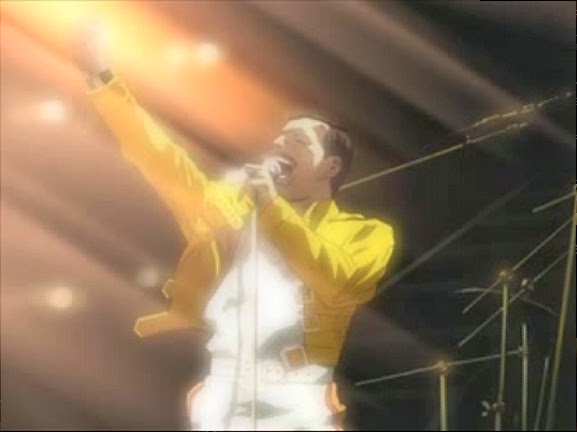 |
| Street Fighter's Eagle is based off Freddie |
 |
| Obvious Queen reference is obvious. |
I have no recollection what I was watching when a preview came up for an anime that had obvious “Queen 2” references.
Little did I realize at the time that “Cromartie High School,” actually had Freddie Mercury as a reoccurring character throughout the show. I have never seen “Cromartie High School” and while it does look terrible I have to admit I really like the idea of Freddie Mercury as an anime character.
Little did I realize at the time that “Cromartie High School,” actually had Freddie Mercury as a reoccurring character throughout the show. I have never seen “Cromartie High School” and while it does look terrible I have to admit I really like the idea of Freddie Mercury as an anime character.
 |
| Freddie Mercury as an anime character. It just feels right. |
Perhaps the most obvious reference Japan made to Queen was when Enix produced the Super Nintendo role playing strategy game “Ogre Battle: The March of the Black Queen.”
I love “Ogre Battle” for the Super Nintendo. I loved how the units could upgrade their class at certain levels assuming their stats were good enough. They did a really good job of making you care about each individual unit you had and in an army of them. In both games there was a whole bunch of special characters you could convince to join your army if you made the right decisions. How you played the game and who you had in your army determined how the game would play out and what ending you would get. The Super Nintendo was my heyday for playing video games, and while I am not much of a gamer now you should still trust me “Ogre Battle” is awesome. Ironically there are no ogres in the “Ogre Battle.”
“Ogre Battle” the game was released in 1993 and I am kind of ashamed to admit that I did not get the Queen references back then, but in my defence the only Queen songs they played on the radio at that time were “We Will Rock You,” “We are the Champions,” “Killer Queen,” “Bicycle Race,” and “Fat Bottom Girls.” You can imagine my delight upon discovering that one of my favourite games was named after not one, but two, Queen songs. Those two sons are of course “Ogre Battle” and “March of the Black Queen,” both tracks from “Queen II.”
“Queen II” is predictably Queen’s second album. Released in 1974 and immediately following their debut album Queen took a turn to the fantastic. The concept album is the telling of a strange story about the White Queen and the Black Queen where nearly every song blends into the next like one big rock opera. On the original release of the album, the record had the first side dedicated as the white side and the second side dedicated as the black side, a novelty lost to us in our modern digital world. The band wore all white on the white side and all black naturally on the black side in the album art.
The first side, the white side, is playful. The White Queen is depicted as an object of celestial beauty and worthy of her monarchal rule. The White Queen is the good queen of this fantastic tale.
The White Queen (As It Began)
The March of The Black Queen
 |
| I am no expert in fashion. That is all. |
Despite being a lesser known album by the hugely successfully band, “Queen II” has had a major artistic ripple throughout Queen’s creative approach, especially during their early years; also it is one of my favorites, partially because of the connection it has to “Ogre Battle” the Super Nintendo game, but also because of the weird fantastic voyage the lyrics and instrumental take us on. It should be noted that Brian May is often overlooked as the truly phenomenal guitar player he is. There are some fantastic tripped out bridges and solos through “Queen II” and “Ogre Battle.” Also the lyrical content is superb, I have spent a lot of time wondering what the two way mirror mountain might be like, twin mirror-mountains with two paths, a mountain that can only be seen from one side, or maybe a mountain made of mirrors.
Then “Queen II” ends with “The Seven Seas of Rhye” which is the most fun a song has ever been. The original self titled Queen album ended with “The Seven Seas of Rhye” but that version is an instrumental, “Queen II”’s version has lyrics which makes it a superior drinking song, and you cannot have a song metaphorically reference seas made of liquor without it naturally becoming a great drinking song.
The Seven Seas of Rhye
 |
| Queen Endora is the Black Queen in Ogre Battle. Nice pants. |
There was a second ogre battle games for the Nintendo 64 titled “Ogre Battle 64 – Person of Lordly Caliber.” I am worried to admit that if “person of lordly caliber” is a Queen reference, I do not know it. “Ogre Battle 64” was also a great game they fixed a few things that were not perfect about the original, also you get to battle ogres this time around.
I really, really like “Ogre Battle” the song and all of "Queen II," it is just such a wonderfully strange song and album, and as far as I can reason the rest of Queen’s musical career, and the video game of the same name, are the logical conclusion. Majestic and outlandish “Ogre Battle” and the white and black queens set a path of adventure and spandex for one of Britain’s greatest rock bands ever, and of course Japan loved it.
Until next month, keep on rocking in the free world.
- King of Braves



